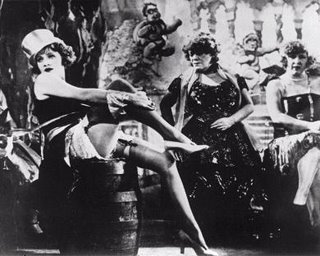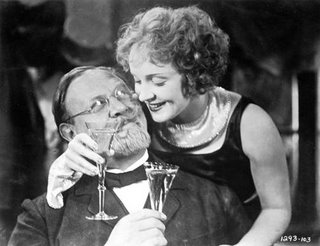We first meet the title character as he sits at a grubby sidewalk café with his pimp buddies. A passerby derides them for their sloth, asking "Are your women on strike?" Accatone relates a story of one of their group who tried to eat a full meal and then swim across the Tiber, and died for his foolishness.
We meet Accatones’ "family", which consists of his whore Madalena , and the wife and children of a jailed friend of his. The whore has just been injured in a motorcycle accident and Accatone comes to check on her. The thing in this scene that strikes you is Accatones’ callousness and disregard for the woman – He starts out berating her for getting hit, and then remarks on her bandaged leg. He asks sarcastically "Did they think you were going to lose it?" Clearly, he thinks the bandages will be bad for business, because bad leg or not, she’s going back to the street.

Pasolini doesn’t give us much in the way of direct information, but there are clues that let us fill in the blanks. It is assumed that the period we are looking at is not too long after the war, and it appears that Accatone has been fairly well-off, but has now fallen on hard times. Early on he stops to play with a small child in the street, and says "Don’t you recognize me? I’m your papa." We briefly meet his ex-wife, who is living with her brother and father, and it’s made pretty clear that Accatone is not wanted around them. The brother even gets into a fight with him in the street.
Time and time again we see the contradictions in the life of this pimp. He spends a lot of time lamenting the life he leads, and saying that he has no future, but the thought of work terrifies him, and he feels no remorse at cheating his friends. He meets the virginal Stella one-day, and is clearly smitten by her. He follows her around and begins a relationship with her. At first, we start to believe that Accatone may have turned a corner in his life, because he tells her that he is attracted to her innocence and helplessness. She is dirt poor and Accatone tells her that he will buy her a new pair of shoes. We wonder how he’s going to do this, since he’s just about as poor, and then we see him back talking to his son on the street , and as he gently removes his son’s gold chain, we finally see Accatone for what he truly is.

We now begin to fear his motives for the beautiful Stella, as we suspect that he has designs on her whoring for him. At a nightclub, Accatone is approached by a couple of rich men, who want to spend some time with his woman. Stella is hesitant, but he pushes her towards them. "Just dance with the man", he tells her. Afterward, of course, he browbeats her for going with them, and "making me look like a fool." Stella is rightly confused, replying "But I thought you wanted me to."
It is now clear that he isn’t going to be able to make a whore out of Stella, so he now has to try other avenues. We’ve briefly met his hard-working brother, and he is able to get Accatone a job gathering up scrap metal, but this isn’t going to work either, since it involves real work. He lasts only one day. Finally he hooks up with a friend who employs a bunch of youths to do petty larceny for him.
Pasolini has done a very unique thing in "Accatone". He has taken a character who is an unscrupulous bum, and surrounded him with like characters, and just let them go on their way. There’s no effort to romanticize him or explain him. The Accatone who meets his fate at the end of the film is consistent with the scumbag that we met at that café at the beginning. We may have hated him or pitied him, but we never wanted to turn away.

 Rath’s colleagues at the college have heard about this by now, and his superior basically tells him that he can’t jeopardize his career by hanging around with a woman like that. Rath pulls himself up and says, "You are talking about my future wife." Soon the professor has quit his job, married Lola and moved in with the travelling revue with her. Rath goes through a physical transformation, as he grows slovenly and bitter in his new life. There is a terrific little montage of him testing the heat of a curling iron that indicates the passing of four years.
Rath’s colleagues at the college have heard about this by now, and his superior basically tells him that he can’t jeopardize his career by hanging around with a woman like that. Rath pulls himself up and says, "You are talking about my future wife." Soon the professor has quit his job, married Lola and moved in with the travelling revue with her. Rath goes through a physical transformation, as he grows slovenly and bitter in his new life. There is a terrific little montage of him testing the heat of a curling iron that indicates the passing of four years.